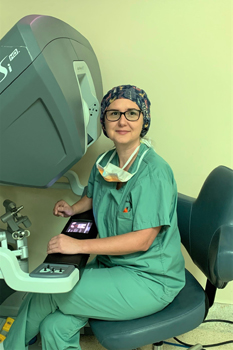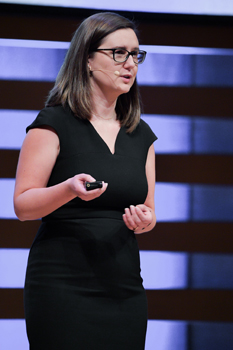A surgeon, engineer, inventor, scientist, mentor and mom: Dr. Monica Farcas shares her passion for science and medicine for the Day of Women in Science

By Ana Gajic

Dr. Monica Farcas
As an academic urology surgeon, a trained engineer, an inventor of medical devices, a scientist, a mentor and a mother of two, Dr. Monica Farcas is often asked by residents and medical school students about balance.
“I want them to know it’s not insurmountable, it’s not impossible,” says Dr. Farcas, a scientist at the Li Ka Shing Knowledge Institute.
“And the more women there are doing this type of work, the clearer that becomes.”
Feb. 11 is the International Day of Women and Girls in Science, a day adopted by the United Nations General Assembly to promote equal access for women and girls in science. According to the UN, globally, only 30 per cent of researchers are women.
In Canada, a study done in 2016 showed that young men with a degree in science, technology, engineering or math fields are twice as likely as their female counterparts to work in science and technology. Already, Dr. Farcas says, the tides are turning. While she’s currently one of only two academic urology surgeons in Toronto, she’s seeing more female trainees in her field.
“In the next five years, the landscape will be dramatically different, which is exciting,” Dr. Farcas says.
For her, math, physics and science were always part of her career plan. Raised in a family that was consistently building, fixing and tinkering with things, Dr. Farcas knew she wanted to go into a hands-on field. She pursued an undergraduate degree in engineering, and a post-graduate research project with cardiac surgeons pointed her towards the field of surgery.
Never having lost her thirst for innovation and research, urology was the perfect match to blend her interests.
“It’s very technologically advanced,” says Dr. Farcas. “We were one of the first fields to adopt advanced robotic surgery and we use lasers in kidney stone treatments.”

When she’s not working with patients in the operating room or in the clinic, Dr. Farcas spends her time imagining inventions that could simplify processes for clinicians and improve the patient experience. This past November, she was one of the finalists in the St. Michael’s Hospital Foundation’s Angels Den competition, pitching a device that eases the transfer of fluid bags to free up nurses’ time.
“I try to bring smart solutions to day-to-day problems I see and foresee that can be easily addressed with a device,” she says.
“My engineering background shows me what’s realistic, while my clinical side has a wish list of all the solutions I want to develop.”
For Dr. Farcas, the academic setting provides a unique approach to innovation – she’s able to focus on research and technology for the sake of improving patients’ lives and furthering knowledge, as opposed to driving towards a for-profit goal. Commercialization is a great success but the primary focus is on solving problems to improve care.
And in academic health sciences, Dr. Farcas says, she can also be a mentor to others.
“When I was in school, I didn’t see mentorship the way I do now. Sometimes a mentor can give you that extra confidence that you can accomplish your goals. If there are those role models out there who are doing what you want to do, speak to them and they can give you the advice you need,” she says.
“It gives you that extra push that you can do it – it’s not impossible.”
About St. Michael’s Hospital
St. Michael’s Hospital provides compassionate care to all who enter its doors. The hospital also provides outstanding medical education to future health care professionals in more than 27 academic disciplines. Critical care and trauma, heart disease, neurosurgery, diabetes, cancer care, care of the homeless and global health are among the Hospital’s recognized areas of expertise. Through the Keenan Research Centre and the Li Ka Shing International Healthcare Education Centre, which make up the Li Ka Shing Knowledge Institute, research and education at St. Michael’s Hospital are recognized and make an impact around the world. Founded in 1892, the hospital is fully affiliated with the University of Toronto.
About Unity Health Toronto
Unity Health Toronto, comprised of Providence Healthcare, St. Joseph’s Health Centre and St. Michael’s Hospital, works to advance the health of everyone in our urban communities and beyond. Our health network serves patients, residents and clients across the full spectrum of care, spanning primary care, secondary community care, tertiary and quaternary care services to post-acute through rehabilitation, palliative care and long-term care, while investing in world-class research and education. For more information, visit www.unityhealth.to.
